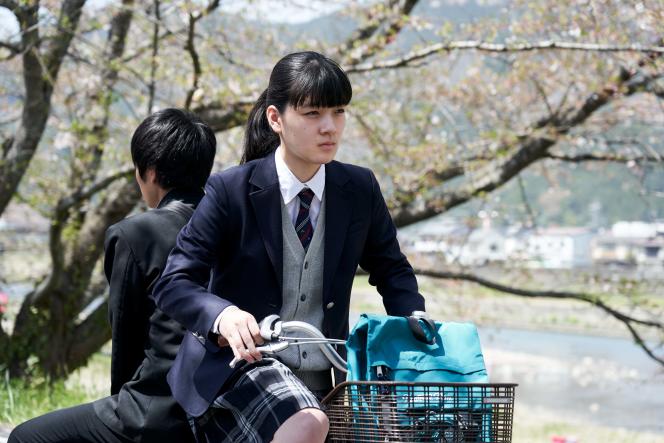THE OPINION OF THE “WORLD” – NOT TO BE MISSED
One of the most beautiful cries of the week is dumb. It is given to us to see – more than to hear – during a silent demonstration, at the crossroads of a small Japanese town. A group of people, motionless, pull out placards bearing peaceful, anti-nuclear slogans. And then that’s all. They watch the cars go by around them, and motorists barely take them into account. There’s something absurd about the scene, as if the drivers were puppets on a merry-go-round, in bumper cars. Is this real very serious?
Among the militants, Yamabuki (Kilala Inori), a high school girl with dark eyes, wearing the uniform skirt and tie. His first name, evocative of these yellow and delicate flowers that grow on the mountainside, gives its title to Juichiro Yamasaki’s third feature film, presented at Cannes in 2022, at Acid (Association of independent cinema for its distribution). Yamabuki’s mother, a committed journalist, died while reporting. Her father (Yohta Kawase) is a policeman and the teenager has nothing to say to him.
Yamabuki is the film of a farmer-filmmaker. Tomato farmer, Juichiro Yamasaki settled in Maniwa, a small town in the mountains of western Japan. Born in Osaka in 1978, the director grew up in a film-loving family and then studied anthropology at Bunkyo University in Kyoto. Shot near his home, co-produced by his company (Film Union Maniwa) and by Survivance, his film is anchored in familiar landscapes to weave a contemporary drama, constantly diverted by a certain sense of the burlesque and the second degree. The expressionist characters summon silent cinema, the humor of Jacques Tati.
Music composed on a toy piano by Olivier Deparis installs a slight dissonance, while the film plays with the archetype of the young Japanese girl, her flawless bangs, her porcelain complexion. The abundant story of Juichiro Yamasaki – whose father taught screenplay – escapes into surrealism and borrows the codes of the B series thriller, during a chase through the mountains.
The mountain as a character
Here it is, this majestic mountain tirelessly dug by a backhoe. The 16 millimeter film magnifies the smoky grain of the anthracite blocks that end up in dust. It is here, in this quarry, that a Korean worker, Chang-su (Kang Yoon-soo), a former Olympic jockey, works. The 30-year-old dreams of going back on horseback, lives with a Japanese woman (Misa Wada) and her little girl, of whom he is not the biological father. No doubt this is why the child calls him “Pap”, and not “Dad” – a detail that is important for this migrant who is desperately trying to settle down and start a family.
You have 36.86% of this article left to read. The following is for subscribers only.
